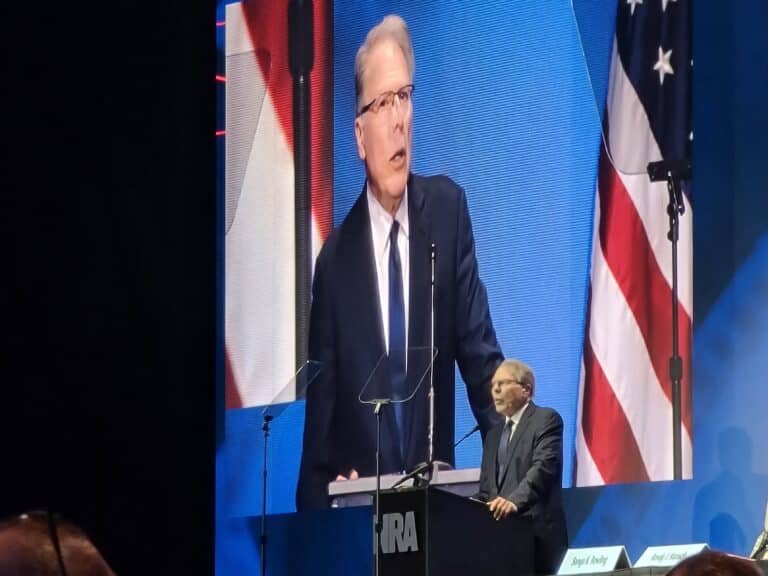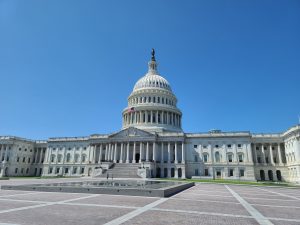A crowd of NRA members rose to their feet and cheered Wayne LaPierre on Saturday as he finished delivering his speech in an Indianapolis conference hall.
It was the second standing ovation LaPierre received at the 2023 Annual Meeting last weekend. The long-time NRA Executive Vice President enjoyed a mostly-positive reception while presiding over a resurgent conference. And he vanquished the last of his vocal dissenters on the group’s board of directors.
The internal fight over alleged financial impropriety by LaPierre and others has raged since the last time the group headed to the Indiana Convention Center in 2019. Charges that he diverted the non-profit’s funds to pay for his private jet travel, luxury vacations, and bespoke suits, as well as using the superyacht of a top NRA contractor on a regular basis, have dogged him ever since. It has led to a complete reshuffle of top NRA positions, a series of legal challenges that threaten the group’s existence, and contributed to declining revenues primarily driven by a massive dropoff in membership.
The outcome of the internal fight will likely determine the organization’s future, which faces potentially ruinous legal sanctions and already appears headed toward another bankruptcy unless it can stop its membership drain.
A big part of that fight was decided almost immediately after the battle began back in 2019. As the meeting of members descended into chaos, one important figure was missing: then-president Oliver North. After accusing LaPierre of inappropriate use of NRA funds, and subsequently being accused of extortion by LaPierre, North left the Annual Meeting in defeat.
North was not reelected in the marathon board meeting that followed, while LaPierre was. Over the next several months, more top NRA officials were pushed out. Long-time treasurer Woody Phillips, LaPierre chief of staff Josh Powell, top lobbyist Chris Cox, and about half a dozen board members who spoke out against LaPierre were gone within the next year.
LaPierre admitted to taking several hundred thousand dollars in “excess benefits” on the NRA’s 2019 IRS filing. But it blamed most of the group’s issues on the purged officials and former top contractor Ackerman McQueen. The NRA’s outside lawyer, Bill Brewer, has argued the group weeded out the bad actors and initiated reforms–despite LaPierre being accused of diverting millions more NRA dollars to himself and remaining in charge.
The NRA has continued to bleed board members, including some of its most famous. It’s lost another treasurer and top lobbyist. But there was a vocal minority of dissidents on the board throughout that time.
When LaPierre decided to take the NRA into bankruptcy (without first informing the board) as a long-shot attempt to evade the New York corruption suit it faced, a handful of board members intervened in the case against the wishes of NRA leadership. Neither side got what they wanted when the case was tossed largely because the gun-rights group was, as they trumpeted in public, still solvent.
But Rocky Marshall, one of the leaders of the intervention attempt, was not renominated to appear on the ballot for the board last year–a process almost entirely controlled by the board’s nominating committee. He was later put up as the first person to run against LaPierre for the first time in decades but only garnered three votes. A more prominent opponent, Allen West, fared even worse the following year.
The vast majority of the 76-member board never bought into the campaign to remove LaPierre. And the membership didn’t seem to either, though two canceled Annual Meetings due to Covid concerns likely didn’t help the cause. It’s likely no coincidence internal activism has declined at the same time NRA membership has dropped, and the coffers of other gun-rights groups have expanded–even if there isn’t a one-to-one correlation.
However, dissident board members have been able to keep the fight going. Philip Journey and Frank Tait remained on the board despite also being leaders in the effort to oppose leadership in the bankruptcy–Tait before he even joined the board. Those two lonely voices fell silent as the NRA board met on Monday.
Their time on the board had also come to an end. And, just like that, the last NRA officials openly critical of LaPierre were gone.
The NRA will move forward with the legal and financial strategy LaPierre and Brewer have laid down over the last four years. There is no reason to expect things to change in the short term–not even the private jet flights.
Of course, the future of the NRA may be out of their control since one of the remaining possible punishments at play in the New York case is the ouster of LaPierre and other members of leadership. And the internal dissent isn’t necessarily gone either. Surprisingly, a short time after NRA members gave LaPierre a standing ovation, a resolution calling for his resignation saw support from about a third of those in attendance.
So, the fight for the NRA is over. Wayne LaPierre won. But it may not be a lasting victory.







6 Responses
Well, I guess this settles it. I was holding out in the last-gasp hope that the NRA would turn around. My NRA Lifetime Membership is now an insult and I will demit membership with a nasty-gram, along with a destroyed membership card mailed to NRA HQ.
That seems to be a common response to the situation among those unhappy with Wayne’s leadership at this point.
I too am a Life Member but have not been financially supporting the NRA since the allegations have come to light, which brings me to my question. There are a growing number of associations out there that are competing for funding. I only have limited funds to give them. Would it be possible for you to evaluate some of the organizations and provide some in sight as to which have the best dollar to action ratio. And which one are just like the NRA, with money going to fund raising vs legal action?
I tend to avoid opinion-based recommendations. But we report on a lot of the legal work that groups such as the Second Amendment Foundation, Firearms Policy Coalition, and Gun Owners of America do. Their finances are often a bit harder to get ahold of beyond the 990s. I’ll try to make reporting on their finances more of a priority, though.
Thank you for this analysis, Stephen, and thank you for those upcoming reports / analyses. And can The Reload look at “effectiveness”, however that’s defined, in the congressional, state legislative, city council trenches?
On my way to Firearms Coalition to thank Jeff Knox and Co.
We will think through some metrics for effectiveness and how to best judge groups’ performance.